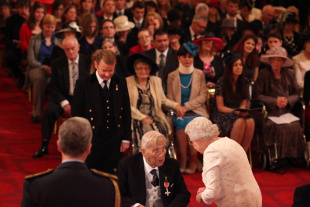George Chesterton

|
|||
|
Related Links
Players/Officials:
George Chesterton
Teams:
England
|
|||
CHESTERTON, GEORGE HERBERT, MBE, who died on November 3, aged 90, was one of a vanished breed of amateurs whose season did not begin until his teaching duties were over for another year. Yet Chesterton was unlike many of his kind in two crucial respects: first, his talent was such that no professional resented his late-summer arrival; second, he put in long days of toil as a bowler, rather than lording it as a batsman. His first-class career stretched from 1948 (when he represented Free Foresters) until 1966 (MCC), but his reputation rests chiefly on his seven seasons with Worcestershire in the 1950s. Contemporaries compared his bowling to Derek Shackleton or, later, Tom Cartwright: naggingly accurate medium, sometimes quicker, off 12 paces. Mainly, he swung the ball away, but the odd one came in. "God knows how," he confided to his biographer, the former Hampshire cricketer Andy Murtagh.
Chesterton began a 76-year association with Malvern College as a pupil in 1936, but the school moved to Blenheim Palace three years later when their buildings were requisitioned by the War Office. At Blenheim, he was hauled before the Duke of Marlborough after breaking a window in the long library while practising his catching. He joined the RAF after school, trained as a pilot in Canada, and danced with Katharine Hepburn and Gypsy Rose Lee on an R&R visit to New York. He flew Sterling bombers, dropping SOE agents into the occupied countries, and towing gliders on D-Day, and into the "cauldron of horror" at Arnhem. Chesterton took up a deferred place at Brasenose College and made his Oxford debut in 1949, playing in a celebrated win over the New Zealanders. One of his earliest victims had been the young Tom Graveney: "He was deceptive, bowling inswingers and little cutters, slightly quicker than he looked."
Chesterton took five for 22 in the victory over Yorkshire, and afterwards was approached by a reporter who, appraising his features, called to his colleague: "Don't bother with the camera, Charley - he's 27, not 17."
He returned to Malvern in 1950 to teach geography and coach cricket, and his first appearance for Worcestershire came that August. Thirty wickets in six games - including six for 61 against Lancashire at Old Trafford and six for 59 against Somerset at New Road - confirmed he was no makeweight. "He was amazing," said Peter Richardson, his captain in 1956 and '57. "You could use him as an opening bowler, but also as a stock bowler: he had enormous energy. He bowled beautifully - and he did it all with a smile on his face."
Chesterton had been offered the chance to succeed Ronnie Bird as Worcestershire captain in 1955 but, although he was keen and the school were willing to grant him time off, it would have hampered his ambitions to become a housemaster: teaching always came first. He played his final game for the county in 1957, having taken 168 wickets at under 20 in 47 matches, but continued to represent MCC on tours of Ireland until 1966. His best figures - seven for 14 - had come at Dublin's College Park in 1956. His overall record was 263 wickets at 22.78 in 72 matches.
Chesterton was an institution at Malvern: housemaster, deputy head, then acting headmaster in his final year, 1982. He also wrote a history of the school, and lived in a house behind the tennis courts until his death. He founded the Chesterton Cup for Midlands schools, was schools sport correspondent of The Times, president of the Cricketer Cup, and club president of Worcestershire between 1990 and 1993. He was also the co-author, with Hubert Doggart, of Oxford and Cambridge Cricket (1989), wrote a wartime memoir, and was the subject of Murtagh's 2012 biography, A Remarkable Man. He received his MBE from the Queen two weeks before he died.

